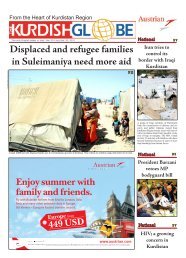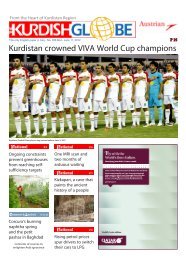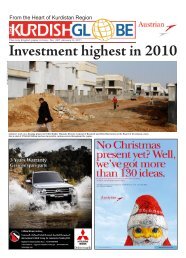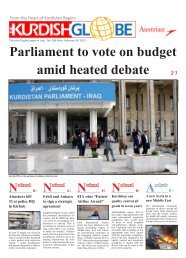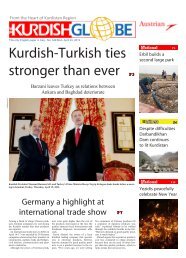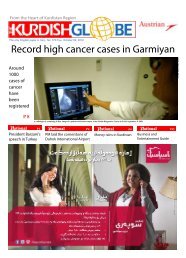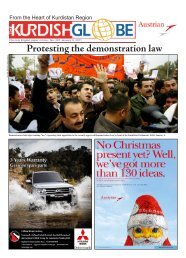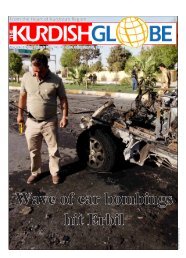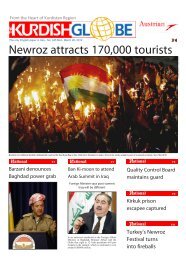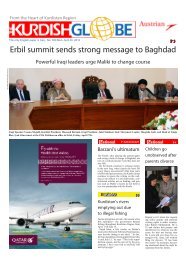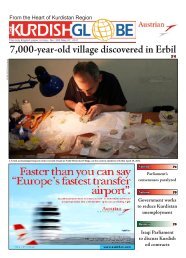Erbil: The host city of sports t ournaments - Kurdish Globe
Erbil: The host city of sports t ournaments - Kurdish Globe
Erbil: The host city of sports t ournaments - Kurdish Globe
Create successful ePaper yourself
Turn your PDF publications into a flip-book with our unique Google optimized e-Paper software.
<strong>The</strong> <strong>Kurdish</strong> <strong>Globe</strong> No. 276, Saturday, October 09, 2010 5<br />
Car accidents increase in Kurdistan<br />
One million vehicles crowd Kurdistan’s roads<br />
As automobile imports<br />
from the U.S., South Kore<br />
rea, and other countries<br />
rise, cars clog the roads <strong>of</strong><br />
Kurdistan Region, leaving<br />
little to no room for operate<br />
tor error.<br />
<strong>The</strong> population <strong>of</strong> Iraqi<br />
Kurdistan Region is about<br />
4 million, while there are<br />
almost 1 million vehicles<br />
in the region. Drivers say<br />
driving is not fun anymore<br />
as too many cars operated<br />
by poor drivers clog the<br />
streets.<br />
“When I drive it is like<br />
I am at war. I feel my car<br />
will be hit at any second,”<br />
said Kawa Hussein. I must<br />
be extremely careful and<br />
look in the mirrors all the<br />
time. Many people do not<br />
respect the rules and they<br />
don’t know how to drive,”<br />
said Hussein, an engineer<br />
working for a Turkish<br />
company in <strong>Erbil</strong> <strong>city</strong>.<br />
Hussein has a 2009 Nissan<br />
pickup and got his driver’s<br />
license two years ago. But<br />
since then, he noticed that<br />
he is stressed out and ange<br />
gry when he gets behind<br />
the wheel.<br />
<strong>The</strong> General Director <strong>of</strong><br />
Kurdistan Region Traffic,<br />
Brig. Rizgar Ali, stated<br />
that in the past 10 months<br />
more than 400 people have<br />
been killed in car accide<br />
dents in Kurdistan Region,<br />
including in Kirkuk <strong>city</strong>,<br />
and about 5,000 have been<br />
A parking lot near the <strong>Erbil</strong> Citadel is depicted in this photo.<br />
injured. “In Suleimaniya<br />
province, 176 have been<br />
killed and 2,075 have been<br />
injured. In <strong>Erbil</strong>, 116 have<br />
been killed and 1,675 have<br />
been injured. In Kirkuk,<br />
62 have been killed and<br />
570 have been injured. Rege<br />
garding Duhok province,<br />
in the past 10 months 57<br />
have been killed and 565<br />
have been injured,” said<br />
Ali. In the past 10 months,<br />
140,555 people received<br />
driver’s licences, added<br />
the Brigadier.<br />
People have long compe<br />
plained <strong>of</strong> drunk drivers,<br />
and according to <strong>Erbil</strong>’s<br />
main emergency hospite<br />
tal, the number <strong>of</strong> car acce<br />
cidents due to alcohol is<br />
rising. Because <strong>of</strong> that,<br />
the General Directorate <strong>of</strong><br />
Traffic issued a decision<br />
saying that “anyone caught<br />
driving under the influe<br />
ence <strong>of</strong> alcohol will either<br />
be arrested and jailed for<br />
three months to one year,<br />
or fined for 300,000 to<br />
500,000 dinars.”<br />
Meanwhile, cars continue<br />
ue to flow into Kurdistan<br />
Region. According to gove<br />
ernment <strong>of</strong>ficials, 11,220<br />
vehicles, mini-trucks, and<br />
trucks were imported into<br />
the Region from different<br />
Western and Asian counte<br />
GLOBE PHOTO/Qassim Khidhir<br />
tries through Haji Omare<br />
ran, an Iraq-Iran border<br />
crossing. “From January 1<br />
to July 1, 2010, there were<br />
11,220 vehicles imported<br />
into Kurdistan only from<br />
this border point,” said<br />
Salam Arab, manager <strong>of</strong><br />
the Haji Omaran border<br />
gate.<br />
Arab said that the cars<br />
are made in the U.S.,<br />
South Korea, Japan, and<br />
Germany. <strong>The</strong>y were sent<br />
through Dubai to Iran as<br />
transit and then to Kurdie<br />
istan. Among the most<br />
prominent cars were the<br />
Japanese Nissan, Korean<br />
Kia, and American Ford.<br />
“<strong>The</strong> KRG gets tax from<br />
imported vehicles accordie<br />
ing to the model and cylie<br />
inder. <strong>The</strong>y range from<br />
800,000 Iraqi dinars to<br />
1,000,800,” said Arab.<br />
Observers complain<br />
about importing these<br />
vehicles into Kurdistan.<br />
“<strong>The</strong> over-importation <strong>of</strong><br />
vehicles has caused traffe<br />
fic jams. We do not have<br />
enough roads for all these<br />
vehicles,” said Mussa<br />
Muhammad, lecturer at<br />
Salahaddin University in<br />
<strong>Erbil</strong>.<br />
Qassim Khidhir<br />
Berlin<br />
qassim.<br />
kurdishglobe@gmail.com<br />
<strong>The</strong> identity <strong>of</strong> Iraqi cities in danger<br />
Lack <strong>of</strong> strategic<br />
planning, security,<br />
and income has put<br />
the identity <strong>of</strong> many<br />
Iraqi historical<br />
cities in danger.<br />
Before the 2003 invasion,<br />
Mosul <strong>city</strong>--some 400<br />
kilometers northwest <strong>of</strong><br />
Baghdad--had different<br />
ethnicities, including Arae<br />
abs, Kurds, Turkmen, and<br />
Shabaks. It was a <strong>city</strong> <strong>of</strong><br />
different religions, such as<br />
Muslims, Christians, and<br />
Yezidis. Now, the <strong>city</strong>’s<br />
identity has changed since<br />
many Christians, Yezidis,<br />
and Kurds were forced to<br />
leave due to threats and sece<br />
curity deterioration. Moreoe<br />
over, Mosul is very rich<br />
in Islamic, Christian, and<br />
Assyrian history. In Mose<br />
sul province are many old<br />
mosques, churches, Iraq’s<br />
first municipal building,<br />
and old shrines--includie<br />
ing a Jewish shrine and a<br />
Jewish school. Many need<br />
urgent care and revitalizate<br />
tion, but lack <strong>of</strong> security<br />
and income makes it diffe<br />
ficult.<br />
“Over the past four years,<br />
it has been very difficult<br />
for us to visit archaeole<br />
logical sites and other old<br />
places in Mosul province<br />
for research and study<br />
due to lack <strong>of</strong> security,”<br />
said Dr. Akram Muhamme<br />
mad, lecturer at College<br />
<strong>of</strong> Archaeology at Mosul<br />
University. “Fortunately,<br />
at this time security is impe<br />
proving slowly. But still<br />
there is no financial suppe<br />
port to conduct research<br />
about the old places in<br />
the province and renovate<br />
them,” Dr. Muhammad<br />
added.<br />
Dr. Muhammad is conce<br />
cerned about the identity<br />
<strong>of</strong> Mosul <strong>city</strong>, which is<br />
going to be permanently<br />
changed soon if authorite<br />
ties do not act seriously.<br />
He said that since 2003,<br />
hundreds <strong>of</strong> thousands<br />
<strong>of</strong> people from villages<br />
Archaeological treasures on cusp <strong>of</strong> disappearing in Mosul<br />
and towns in the province<br />
have settled in Mosul <strong>city</strong>;<br />
the majority <strong>of</strong> them have<br />
built illegal houses in the<br />
<strong>city</strong> and in the former milite<br />
tary bases that belonged to<br />
Saddam Hussein’s regime.<br />
“Now in Mosul <strong>city</strong>, there<br />
are a lot <strong>of</strong> slums; there is<br />
no clear master plan for<br />
the <strong>city</strong>,” Dr. Muhammad<br />
noted.<br />
Currently, Iraq faces a<br />
huge housing problem.<br />
<strong>The</strong> Iraqi Ministry <strong>of</strong> Rece<br />
construction and Housie<br />
ing stated that Iraq needs<br />
more than 2 million housie<br />
ing units, and the Ministry<br />
said it has talked with 300<br />
international companies to<br />
build those units.<br />
On October 3, Iraqi unive<br />
versities in Baghdad, Diye<br />
yala, Duhok, and Mosul,<br />
and the TU Dortmund Unive<br />
versity in Germany, held a<br />
three-day joint conference<br />
on planning in Duhok <strong>city</strong>.<br />
<strong>The</strong> conference dealt with<br />
sustainable revitalization<br />
<strong>of</strong> historic cities within a<br />
regional context. In Februae<br />
ary 2009, the German and<br />
Iraqi governments signed<br />
a memorandum <strong>of</strong> unde<br />
derstanding on university<br />
cooperation with the longterm<br />
goal <strong>of</strong> establishing a<br />
German-Iraqi university in<br />
Iraq. As a preparatory step,<br />
five German universities<br />
were commissioned to deve<br />
velop specific components<br />
for this future university.<br />
TU Dortmund University<br />
was tasked to design the<br />
planning education and<br />
research component.<br />
Pr<strong>of</strong>essor Christa Reiche<br />
er from TU Dortmund said<br />
historic cities can only be<br />
successful within context.<br />
Pr<strong>of</strong>essor Reicher pointed<br />
out that people are leaving<br />
the historic towns and citie<br />
ies to live in big cities, in<br />
particularly young people,<br />
for job opportunities. She<br />
complained about the way<br />
the historic <strong>Erbil</strong> citadel<br />
is being renovated. “<strong>The</strong><br />
Kurdistan Regional Gove<br />
ernment shouldn’t have<br />
forced Citadel inhabitants<br />
to evacuate in order to renoe<br />
ovate; inhabitants should<br />
have stayed so that they<br />
could be involved in the<br />
renovation.” She added:<br />
“Strategic planning is cruce<br />
cial to sustain the historic<br />
cities--strategic planning<br />
not only for the building,<br />
but also for the people<br />
who are living in the histe<br />
toric cities.”<br />
<strong>The</strong> <strong>Erbil</strong> Citadel in Erbe<br />
bil <strong>city</strong> is now under renove<br />
vation by UNESCO. <strong>The</strong><br />
estimated 8,000-year-old<br />
Citadel, located in the<br />
center <strong>of</strong> <strong>Erbil</strong>, claims<br />
to be the oldest continuoe<br />
ously inhabited <strong>city</strong> in the<br />
world. <strong>The</strong>re are over 500<br />
residential buildings inside<br />
the Citadel, most <strong>of</strong> which<br />
are built around courtye<br />
yards and made <strong>of</strong> brick<br />
and short-span timber with<br />
mud ro<strong>of</strong>ing. Many buildie<br />
ings have opulent interior<br />
decoration with painted<br />
ornaments, colored glass<br />
windows, carved doors,<br />
arcades supported by timbe<br />
ber, and marble columns.<br />
Now the Citadel is «tempe<br />
porarily» listed on UNESCe<br />
CO’s World Heritage List.<br />
After the conference,<br />
participants will tour the<br />
<strong>Erbil</strong> Citadel and visit histe<br />
toric cities and towns in<br />
Duhok and Suleimaniya<br />
province. Chairman <strong>of</strong> the<br />
Higher Institute <strong>of</strong> Planne<br />
ning in Duhok Universe<br />
sity, Dr. Nazar Numan,<br />
described the conference<br />
as a great opportunity for<br />
Iraqi universities to hold a<br />
conference together with a<br />
German university in this<br />
difficult time for Iraq. He<br />
remarked that five students<br />
from Duhok University<br />
are now studying in TU<br />
Dortmund in Germany--<br />
three <strong>of</strong> them are studying<br />
for their bachelor’s dege<br />
gree, and the other two are<br />
Ph.D. students studying<br />
urban planning. This is the<br />
first time Iraqi universities<br />
and a German university<br />
discuss urban planning.<br />
A similar conference is<br />
planned soon in <strong>Erbil</strong> <strong>city</strong>.



